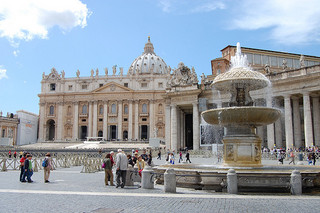NOTE: I wrote this in 2010 and posted it on open.salon.com. Thought I’d post it here, too.
I was sitting in a dark Irish pub in Portsmouth the other night, the dinner rush past, the place emptying out, just a few people here and there hunched over their pints, while Celtic fusion music blasted from the high oaken beams. At the next table sat a spry little man with short gray hair and a trim goatee. He was shabbily dressed: faded dark cotton turtleneck, dungarees, running shoes. A large leather bag on his table disgorged a heap of papers, which he was steadily working his way through. He’d pull out an envelope, rip it open, read its contents, and scribble some notes in a battered spiral notebook. Rip, read, scribble. Repeat. He muttered as he worked. His face was weathered, but his eyes beamed with an impish delight. He smiled to himself between gulps of his Guinness.
“Ho ho!” he exclaimed suddenly, sitting upright with such force that the long bench we were both perched rocked and swayed. “Oh no, you sly old dog! You scoundrel! I’m not going to publish your little villanelle. Oh, it’s a nice enough piece, as usual, but you caused the global recession!”
He chuckled to himself, tossed the paper aside, and sipped his stout.
“Excuse me,” I said. “I couldn’t help overhearing. Did you just say you weren’t going to publish someone because he caused the recession?”
He turned to me, beaming and bemused. Probably a bit drunk, I decided. He nodded.
“So you’re the editor of a poetry magazine?” I asked.
“That’s right.”
“And you received—”
“Uh huh.”
“So can I ask who the author is? Robert Rubin? Phill Gramm?”
He shook his head. “No.”
“Alan Greenspan, then? Dick Fuld?! Did Dick Fuld of Lehman Brothers send you a poem?”
“No, none of those guys are poets, so far as I know. They all read poetry, of course, but they don’t write it.”
“Then who?”
He named a name. I didn’t recognize it. My benchmate, who introduced himself as Jerry, explained that the poet in question was a middle-aged gentleman, decently respected in literary circles, probably best known for his work in the creative writing program at a small East Coast college. These days his work is mostly published in chapbooks put out by small regional presses; it’s been decades since he’s been published by a major New York house. Anything else? Paunchy. Gray frizzled hair. A heavy smoker. Twice divorced. Probably on the wagon again, which is a good thing. Pretty much your run-of-the-mill academic poet. Hardly a household name. For now, I’ll just call him Harold.
“And this Harold—he caused the world’s economy to melt down?”
“It was mostly his doing. Yes.”
“How in God’s name did a mere poet—”
“A mere what?” snapped Jerry. “Remember whom you’re talking about. Ever read Shelley? The Defence of Poetry? The last line: ‘Poets are the unacknowledged legislators of the world.'”
“A fine sentiment, but—”
He pounded his fist. “Not a sentiment. Reality.”
“But how? So few people read poetry these days. Now if you had said rock stars and movie stars—”
“I’ll lay it out for you.”
He was already drunk, but in the course of the next few hours, we would both consume countless more pints, quaffing Guinness as though it were a balm for our fevered minds, our spinning heads, our jabbering tongues.
That big leather bag seemed bottomless, and from it Jerry produced chapbooks, bibliographies, newspaper clippings, and more scribbled notes.
He laid out his case as though he were a practiced trial attorney. Poets, he said, had always ruled the world, and they did so now, but in a quiet way. He showed me news clippings from mid-century in which headlines trumpeted, for example, the disapproval of well known poets for nuclear weapons.
Fine and good, I countered, but poets seem to have lost that influence now. The press might interview Brad Pitt about New Orleans or Madonna about Africa, but when was the last time you saw Louise Gluck or John Ashbury quoted about health care?
“We’re just working underground,” he said. In the early seventies, there was a joint effort to write an epic piece, a sort of William Blake-meets-the-Rand Corporation type of screed, but the authors intentionally stifled it . “Once Watergate came out, we decided not become a distraction. It just wasn’t the right time for a major new epic that would sweep readers off their feet and paint an entirely new destiny for humankind. Besides, some of the rhymes schemes were really hard.”
So the poets fell back, hunkered down, and they’ve been working in the shadows ever since. And Harold, our frizzy-haired, absent-minded poet, a man seen puttering on college greens and losing his way among library stacks, a fussy man known for his fondness for Herrick and diet cola, has been quietly and diligently poetizing to become nothing less than the Alexander of Our Age.
Imagine my skepticism. But Jerry drew a line down a paper and asked me to name the major events of the past 30 years. I rattled some off: the end of Communism, the growth of the Internet, the First Gulf War. You can imagine the list. Then Jerry dug in his bag and produced a stack of chapbooks, all written by our friend Harold, and all purporting to address these major events six months in advance. The correspondence was uncanny.
Even the real estate bubble of the past decade had been sung of by our paunchy, doddering swan. I read sonnets about interest rates and couplets about closings. And I even skimmed a minor epic titled Prometheus under Contract.
Jerry shifted uncomfortably. “Like a lot of people, Harold got swept up in the real estate thing,” he said. “I can’t say this is all his finest work.”
I can sate all man’s desires
With these re-fi’s in Fort Myers.
No, probably not. But apparently Greenspan lapped it up.
“All right, then” I said, my addled mind struggling to muster counter-arguments. “You’ve shown me that Harold wrote about all this. But if he’s so powerful, why haven’t I heard of him?”
“Because if you had heard of him, he would be acknowledged. Remember what Shelley said: poets are the unacknowledged legislators. Unacknowledged. Nobody knows.”
“Fine, but then how do they legislate?”
“With these,” he said, holding up a chapbook. “Look. You’ll see.”
He reached again into his bag and began pulling out photographs, big and small, color and black-and-white. You’ve seen these photographs, because they’ve run in newspapers and magazines and on television. They show presidents and prime ministers, statesman, senators, congressman, U.N. officials, surgeons generals—the whole worldly, powerful lot. And in every picture, unnoticed by me until Jerry’s crooked, leathery finger pointed it out, was a chapbook, or a copy of American Poetry Review, or Poetry magazine, lying on a desk, or peeking out of a valise, or being held, right there in Angela Merkel’s sweaty hand, while she shielded her eyes from the sun.
“How do I know these haven’t been Photoshoped?” I asked.
Jerry spluttered. “Because these are poets we’re talking about! Have you ever seen what poets do with Photoshop? Just look at some of these chapbook covers!”
Point taken. Professional grade forgery was out of the question. Except for one photo: an old snapshot of the Senate Foreign Relations Committee with Jesse Helms reading from the selected poems of Adrienne Rich.
“Yeah, that one was probably tampered with,” Jerry conceded, “but the rest are real.”
All right. So this doddering poet named Harold is ruling the world, and there are bunch of other poets also making their own contributions. But Harold is at the top. He probably made some good old-fashioned filthy lucre from all this unacknowledged legislating. What did he do with it?
Jerry looked sheepish. “Well, keep in mind, these are poets we’re talking about.” He shuffled his feet, drank from his pint glass. “Harold . . . Harold bought a sweater.”
“A really nice sweater,” he added. “Not one of those sweaters that you can buy from L.L. Bean or Macy’s. An extraordinary sweater. You know the kind where it looks like it’s made from six or seven different sweaters torn up and sewn together? They used to be quite fashionable with wealthy people in places like New York and San Francisco about fifteen years ago. Harold bought one of those. No one on campus had seen anything like it. He looked dazzling. Completely transformed!”
“That’s all he bought?!”
“It’s enough. More than enough, really, because the other poets thought he was showing off, parading like a peacock in his multi-colored sweater at readings and faculty meetings. People said things. Cruel things. They whispered in front of him. Harold became self-conscious, as poets are wont to do. He embarrasses easily, you know. So he took to wearing a trenchcoat over his sweater. Which makes him very warm. But at least he gets to wear his sweater.”
My head was spinning. I took a deep drink, and my eyes just happened to light just then on Jerry’s leather bag, which bore an embroidered patch representing the flag of a major European country.
“Er, yeah,” said Jerry. “I was hoping you wouldn’t notice that. This is an official diplomatic pouch. We must have gotten them mixed up the other night. It’s about the same size as my bike messenger bag, and the contents of the two are more or less the same.”
Contents more or less the same?! Foreign diplomats carrying poetry chapbooks?! The room seemed to lurch.
Jerry seized my shoulders. He pressed his florid, grizzled face close to mine. “Dan Brown’s got it all wrong,” he hissed. “The secret societies that rule the world are not Masons or Knights Templar. They’re poets! Poets, do you hear me?!”
“For thousands of years,” he said, “poets have been singers of the human song. In any society, they’re its most articulate writers. Every society on earth has music and poetry. Language is just as important as it ever was. The human heart remains troubled and longing. Of course poets are this world’s leaders! How could it not be so?”
He turned away and whimpered. “How could it not be so! How could it not be so . . . ”
The room shifted. Lamps extinguished. Closing time. I felt my feet carrying me.
We were on the street, assailed by a bitter wind. Market Square in Portsmouth was nearly deserted. A couple of harsh spotlights shone on the white steeple that soared into the night.
I had something in my hand. It was Harold’s latest chapbook, Aubade to Thrace, which has precipitated the financial and political crisis in Greece. I curled the chapbook tightly. I held it close to my pants and tried to slip it in my pocket. I wanted to study it. I wanted to learn what else was about to happen in the world. What did the future hold for economies, disasters, and wars? Which countries would topple? Which would rise? I shifted on my feet, shielding the little book with my leg.
Jerry was staggering over to the little white ticket kiosk. He gave me a half-hearted wave, then lifted up an old black bicycle that had been lying on its side. It was a battered, old thing, just the sort of dilapidated contraption you would expect to be ridden by an aging, solitary poet who spends evenings stapling together a local poetry magazine in his apartment. Jerry raised his leg halfway over the seat and stopped. He lowered his leg. He stood.
“You still don’t believe me,” he said, glaring at me with a drunk’s belligerence. “I can tell. You don’t. Well, watch this.”
He laid down the bicycle. He walked to curb. He stood there, just stood there, gazing stupidly up the street. He closed his eyes, opened them again . The cold wind whipped around us.
“I want to go home,” he said. He spoke loudly. “I want to go home now.”
I glanced about. The square was still deserted. It was late, probably midnight. Who was he talking to?
Headlights appeared. A car turned the corner. It came gliding along Pleasant Street, a long, black limousine with tinted windows, and halted a few feet from Jerry. The driver, a burly, close-shaven man in a suit, sprang out and came scurrying around the front of the car. He opened the passenger’s door and stood at attention.
“Good night,” said Jerry, disappearing into the car. A moment later, they drove off and turned onto Congress Street.
Somebody bumped me, I nearly toppled to the ground. A big guy in a black wool coat, slacks, shiny shoes, was barreling along the sidewalk. I recognized the type. In Washington, D.C., you see such people standing around the cars of senators and judges, and walking warily through public squares, eyeing the crowds. This guy, a real hulk, stormed up the street and vanished at the corner.
But why did he have to bump me? There was plenty of room for both of us on this broad swath of sidewalk.
My hand twitched. I wasn’t holding Aubade to Thrace any more. I looked around me. I spun around, looking and looking. The chapbook was gone.
****
I woke next morning with an awful headache. I had the sensation of having inhabited one of Shelley’s visionary poems like Queen Mab or The Triumph of Life. What visions had unrolled through my mind! Was the night with Jerry simply a mad dream?
My wife found me in the living room, huddled in a blanket by the TV, switching channels from C-SPAN to CNN to PBS. I saw politicians, generals, bankers, doctors, and other experts talking about the great matters of the day.
“What are you doing?” she asked.
“I’m looking any sign of poetry. I’m looking for any sign that today we are being somehow guided by the wisdom of the ages, that we have learned something, remembered something true and beautiful and everlasting that has been set down before. I’m looking for a sign that we understand human desires and the horrors of war, which have been faithfully recorded for millennia. I’m looking for some indication, any indication at all, that we remember anything other than our own impulses and cravings, and that in some way, we hold this world and everything in it in reverence.”
“Well, good luck with that,” she said.
 When the Vatican announced that contrite Catholics could earn indulgences and shorten their time in purgatory by following the Pope on Twitter, I thought, “Indulgences? Now there’s one Twitter stat you can’t track in Hootsuite.”
When the Vatican announced that contrite Catholics could earn indulgences and shorten their time in purgatory by following the Pope on Twitter, I thought, “Indulgences? Now there’s one Twitter stat you can’t track in Hootsuite.”

